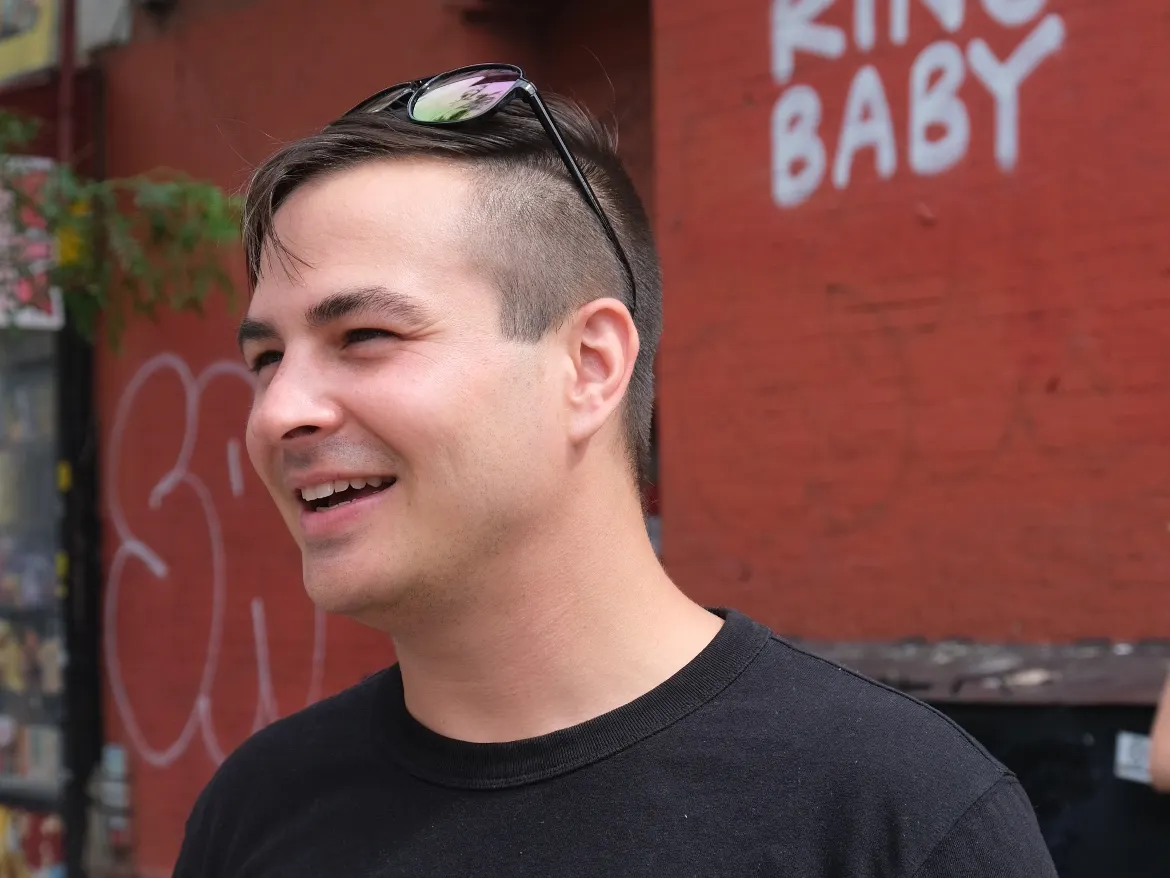In brief
- Alex Adelman, CEO and co-founder of Bitcoin rewards app Lolli, spoke with Decrypt at NFT NYC last week.
- He’s a fan of the rise of NFTs and culture in crypto, and believes the Bitcoin community should more broadly embrace such use cases.
NFT NYC took place last week, and even crypto’s lingering bear market couldn’t kill the vibes. Major Ethereum NFT projects like the Bored Ape Yacht Club, Doodles, and World of Women brought in celebrities and major performers, while other NFT communities held their own exclusive gatherings for holders.
And while there’s only modest NFT activity taking place around Bitcoin, Alex Adelman, the CEO and co-founder of Bitcoin rewards app, Lolli, told Decrypt that he loves the community and celebrations around NFT artwork and collectibles.
“I think NFTs are good for this space,” he said at an NFT NYC satellite event last week, calling them the “perfect intersection of culture and technology.”
Adelman, who said he considers himself “part of the degen communities” that have formed around NFTs, added that last October’s NFT NYC event first showed him the potential for artists to embrace the technology.
“That’s probably one of the best things about NFTs, is that they are empowering real artists to build their careers,” he explained. “And it’s teaching people about crypto and about owning their own keys, owning their own assets. So I think it’s net positive for the space, and definitely good for the macro of people learning about crypto.”
An NFT is a blockchain token that serves as a proof of ownership to a digital item, such as artwork or video game items. The market generated $25 billion in trading volume in 2021 as it gained mainstream recognition.

Lolli pays users Bitcoin rewards for shopping at more than 1,000 partnered retailers, and Adelman—who sports “laser eyes” on Twitter—is seen by many as a Bitcoin maximalist. However, he prefers a softer description: a “Bitcoin optimist.” He’s not opposed to wider crypto adoption, even if he ultimately wants Bitcoin to lead the way.
It’s a distinction with which many self-proclaimed maximalists would quibble. Just yesterday, Bitcoin personality Nic Carter received backlash from maxis on Twitter when he revealed that his Castle Island Ventures firm invested in a Web3 development tool built for other blockchains. (Adelman defended Carter.)
Based on his comments above, Adelman clearly doesn’t scoff at the rise of artwork and culture via NFTs. In fact, he sees it as an opportunity that the Bitcoin community should have owned—and still has the potential to embrace via layer-2 solutions that work atop Bitcoin’s blockchain.
“Kudos to Ethereum and the community for capturing the zeitgeist and bringing in real artists,” he said. “I’m kind of sad. I think Bitcoin should have captured a lot of that. They had 13 years to do it, and a lot of that was lost.”
Early attempts at putting artwork and other media assets on the blockchain—before the non-fungible token (NFT) term was coined—were built on Bitcoin-derived platforms like Counterparty. Rare Pepe NFTs, for example, have since been “wrapped” and bridged to Ethereum for easier trading and collecting.
And as mentioned, there is some NFT activity happening on top of Bitcoin. Smart contract platform Stacks, which its creators describe as a “layer-1.5” platform, is secured by Bitcoin, which means it bundles up transactions from its own blockchain and commits them to Bitcoin for safekeeping.
Rationalism leads to hyperbitcoinization.
Toxic maximalism is the harder path to mass adoption.
Good thing bitcoin dgaf and will get there eventually either way, it's just going to be a harder and longer battle the direction the toxic maxi community is heading.
— §Alex Adelman 🍭 (@alexadelman) June 29, 2022
NFTs began gaining traction on Stacks last fall, although the total activity is a drop in the bucket compared to Ethereum’s NFT market dominance. Adelman said he hasn’t “seen a project that he loves on Stacks yet,” but that he’s a fan of the NFT art scene on Tezos, a rival layer-1 platform that’s also corralled prominent partners like Ubisoft and The Gap.
Even 13 years out, Adelman believes Bitcoin is “in its early days,” and he’s excited about other potential layer-2 platforms that build upon its blockchain to enable NFTs and apps. He pointed to the work of Twitter founder Jack Dorsey and Block’s TBD division, including the recently teased “Web5”—an “extra decentralized web” built atop Bitcoin.
“I think that we’re still in day one, and the Bitcoin community is waking up to that fact,” he said. “It’s like: How are you going to hate on artists? How are you going to hate on people who are building real things? You can’t just sit on Bitcoin forever. You have to innovate.”

